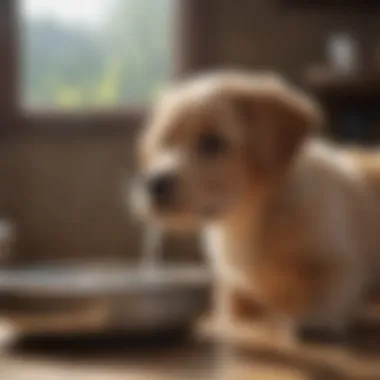Effective Solutions to Cure Diarrhea in Puppies


Intro
Curing diarrhea in puppies is a concern that many pet owners face at some point. Often, young dogs will experience digestive upset due to a variety of reasons, such as diet changes, infections, or stress. Understanding how to address this condition effectively can help ensure the health and comfort of your pet. In this section, we detail key considerations to help manage diarrhea in your puppy and recognize when help is needed.
Understanding Your Pet
Diarrhea in puppies can stem from various intrinsic factors that are common in specific breeds and temperaments. Identifying these traits is crucial for proper management.
Breed Traits
Certain breeds may be more susceptible to gastrointestinal issues due to their genetics. For example, smaller breeds might experience sensitivities to certain foods, while larger breeds can have different digestive concerns. It helps to know your puppy's breed and common health issues associated.
Common Temperaments
Puppies can exhibit different temperamental traits, from curious and active to shy or anxious. These traits often influence how they react to external stimuli, including stressors that might lead to diarrhea. Understanding your puppy's behavior can aid in identifying if stress is a factor, prompting appropriate actions to mitigate anxiety and improve their digestive health.
Special Needs
Some puppies have unique dietary or health needs that require careful consideration. If your puppy has a pre-existing condition, or if their digestive system is more sensitive, it's essential to adapt their diet and care accordingly. For example, some pups may benefit from easily digestible food while recuperating from diarrhea.
Pet Care Essentials
Proper care is foundational to puppy health and can significantly impact the risk or resolution of diarrhea.
Nutrition and Feeding Guidelines
A balanced diet is essential for a puppy's development. During diarrhea, it may be necessary to temporarily change their diet. Options include bland foods, like boiled chicken and rice, or prescription diets designed for digestive issues. Ensuring hydration is also vital. Always provide fresh water, as dehydration can quickly become a problem.
Grooming Tips and Techniques
While grooming is often associated with appearance, it also plays a role in overall health. Regular grooming helps to keep your puppy comfortable. They may avoid dirty areas while they have diarrhea, so frequent routine cleaning may be necessary.
Health and Wellness
Regular veterinary checkups safeguard your puppy's health. Keeping their vaccinations up to date helps prevent infections that can cause diarrhea. Use parasite prevention as well, as worms can affect their digestive tract efficiency and cause upset.
Training and Behavior
Training is important for a puppy’s behavior management, which can be linked to instances that may lead to diarrhea.
Basic Training Techniques
Establishing a routine for potty training helps in reducing accidents. Frequent trips outside can minimize stress and anxiety, contributing to better digestive health. Also, rewarding your puppy for going outside can reinforce good habits.
Behavioral Problems and Solutions
Puppies may show signs of anxiety that can lead to digestive disturbances. Identifying triggers and adjusting their environment may help. Any change that disrupts their normal routine should be addressed promptly.
Mental Stimulation Activities
Keeping a puppy mentally stimulated can help reduce anxiety. Puzzles and interactive toys can engage their mind and reduce symptoms indirectly related to stress-induced diarrhea.
Engaging with Your Pet
Engaging your puppy in constructive play can enhance their well-being.
Interactive Games and Toys
Using toys that promote interaction and engagement can distract your puppy during sensitive times, benefiting their overall mental health.
Safe Outdoor Activities
Leashing your puppy for outdoor play not only offers exercise but can also assist in creating a solid routine to relieve stress, which may otherwise impact their digestion.
Family-Friendly Pet Interactions
Involving family members is critical. Teaching everyone how to handle and engage with your puppy reduces stress and builds trust, reinforcing a stable environment.
Pet Adoption and Integration


For those considering a puppy adoption, understanding how to integrate a new pet into your home structure can help prevent unnecessary stressors.
Choosing the Right Pet for Your Lifestyle
When adopting, reflect on your lifestyle and the puppy’s needs. Make mindful choices to ensure compatibility, promoting better health outcomes.
Preparing Your Home for a New Pet
Creating a conducive environment for the new addition will facilitate a smoother transition. Ensure there is a quiet space where the puppy can retreat if feeling overwhelmed.
Tips for Smooth Prelims
When introducing a new pet to the household, gradual introductions are beneficial. This helps in establishing a calm environment.
Dogs may show anxiety in response to changes. Monitor their behavior closely to identify needs.
In summary, addressing diarrhea in puppies requires a multifaceted approach. Understanding breed traits and behaviors, alongside proper nutrition and care, plays an integral role in managing and curing this condition. Engaging with your puppy positively reinforces good health practices, fostering a happier pup.
Understanding Diarrhea in Puppies
Diarrhea in puppies is a critical issue that can substantially affect their health. Understanding its nature can help pet owners respond effectively. By recognizing what diarrhea signifies and its potential causes, owners can act promptly in mitigating risks and providing care. Puppies, with their delicate digestive systems, often face unique challenges. Their vulnerability to dehydration makes it essential to grasp the underpinnings of diarrhea. This section will elucidate key information that is instrumental in devising an appropriate response.
Definition of Diarrhea
Diarrhea is defined as an increase in the frequency and liquidity of bowel movements. In puppies, it often manifests itself as loose or watery stools. The condition may vary from mild to severe. It can lead to rapid fluid loss and further complications. Timely recognition of diarrhea is necessary to ensure proper treatment and care. Understanding this condition thoroughly is the first step in addressing it effectively.
Common Causes of Diarrhea in Puppies
Several factors can contribute to diarrhea in puppies. Recognizing these causes is essential for a tailored approach to treatment.
Dietary Indiscretion
Dietary indiscretion refers to puppies consuming inappropriate or spoiled food. This can include human food, trash, or foreign objects. Puppies are naturally curious, which can lead them to ingest harmful substances. The key characteristic of this behavior is its unpredictability—it can occur at any time. While not inherently dangerous, dietary indiscretion can interrupt digestive function. Owners should carefully monitor what their puppies eat and prevent access to unsuitable food items.
Infections
Infections caused by viruses or bacteria can lead to significant gastrointestinal upset in puppies. Common pathogens include parvovirus and salmonella. The distinctive aspect of infections is their potential severity. They can produce other symptoms alongside diarrhea, such as vomiting and lethargy. Prompt identification and control of these infections are vital. Vaccination plays an important role in preventing these diseases, making it a popular recommendation for puppy care.
Parasites
Parasites, such as worms, can invade a puppy's gastrointestinal tract. Common types include roundworms and giardia. The key feature of parasites is their often-hidden presence. They may not always produce noticeable symptoms initially, yet they can cause severe health problems over time. Regular veterinary checks and preventive treatments are crucial for managing parasite risks in young puppies.
Underlying Health Issues
Underlying health issues, such as liver disease or allergies, can result in diarrhea. Puppies with pre-existing conditions may exhibit more pronounced symptoms. The unique characteristic of this cause is the potential for long-term implications. Untreated health issues can lead to chronic diarrhea and further complications. Therefore, a thorough examination by a veterinarian is warranted to address potential underlying health problems.
Stress and Anxiety
Emotional factors, including stress and anxiety, can trigger diarrhea in puppies. Changes in environment, new additions to the household, or separation from owners can influence a puppy's mental state. The important element to note is that, although not a direct physical cause, stress can significantly impact a puppy's digestive health. Monitoring the puppy's environment and making adjustments can mitigate stress-related issues.
Identifying Symptoms of Diarrhea
Understanding the symptoms can aid in managing diarrhea effectively. Noticing the frequency and consistency of bowel movements helps gauge severity.
Frequency and Consistency
The frequency and consistency of stools are key indicators of the condition's severity. For puppies, multiple loose or watery movements within a short time frame are concerning. A consistent pattern can signal a more serious issue. Observing these aspects is beneficial for informed decision-making regarding care.
Accompanying Signs
Accompanying signs, such as vomiting, lethargy, or fever, can indicate underlying complications. It is essential to monitor for these signals while assessing diarrhea. Recognizing these additional symptoms can provide insights into the puppy's overall health and any immediate steps necessary.
Duration of Symptoms
The duration of diarrhea is significant in assessing potential causes. Diarrhea lasting more than a day requires prompt attention. Short episodes may not be as critical but still warrant observation. Owners should take note of how long the symptoms persist, as this can guide decisions regarding veterinary consultation and further care.
Immediate Steps to Take
Dealing with diarrhea in puppies can be stressful. Understanding immediate actions is crucial for the well-being and recovery of your puppy. Taking the right steps early can help manage situational severity and prevent further complications. This section will guide you on how to assess your puppy's condition and monitor hydration levels effectively.
Assessing Severity


When your puppy shows signs of diarrhea, the first task is to assess the severity of the condition. Severity may differ based on age, size, and overall health. Factors like frequency of stool, consistency, and accompanying symptoms guide your assessment.
A mild case may consist of soft stools occurring occasionally. However, if your puppy experiences frequent, watery stools, this indicates more severe diarrhea. Pay attention to any changes in behavior, energy levels, or appetite.
Knowing whether the diarrhea is severe helps in deciding if you should take immediate action or consult a veterinarian.
Monitoring Hydration Levels
Hydration is key when managing diarrhea. Loss of fluids can happen quickly in puppies. Thus, closely monitoring hydration is necessary. Puppies dehydrate fast, and a lack of fluid intake can lead to serious issues.
Signs of Dehydration
Signs of dehydration can manifest in several ways. Look for these common indicators:
- Dry gums and mouth
- Decreased skin elasticity; skin may not quickly return to normal when pinched
- Sunken eyes
- Lethargy or weakness
Recognizing these signs is critical. Noticing early indicators enables quicker response and can improve outcomes significantly.
Rehydration Techniques
Once dehydration is recognized, rehydration is paramount. Providing fluids is the first step. You can offer:
- Fresh water
- Electrolyte solutions formulated for pets
- Broth without any onion or garlic for flavor
Rehydration techniques can vary. If your puppy refuses to drink, consider using a syringe to encourage fluid intake. Commercial rehydration solutions are ideal. These solutions help restore the essential nutrients that may be lost during diarrhea.
Rehydration must be approached with care to avoid overwhelming the puppy's stomach. Giving small amounts frequently is advisable.
Remember, proper hydration is crucial for recovery. Monitor your puppy closely until symptoms improve, and don’t hesitate to seek veterinary assistance if needed.
Dietary Management
Dietary management plays a crucial role in addressing diarrhea in puppies. It focuses not only on what to feed but also on how to adapt a puppy's diet during and after digestive disturbances. Proper dietary habits can significantly influence recovery, hydration levels, and overall health. During a bout of diarrhea, puppies may lose essential nutrients and hydration. A carefully managed diet can help replenish lost nutrients and restore gut health, reducing the likelihood of recurrence.
Fasting Guidelines
Fasting can be an immediate and effective step to settle a puppy's upset stomach. Following a bout of diarrhea, withholding food for a period of 12 to 24 hours allows the digestive system to recover. This brief fast helps the gut reset. However, it is essential to ensure that the puppy stays hydrated. Access to fresh water must be constant to prevent dehydration.
Gradual Reintroduction of Food
After the fasting period, food introduction should be gradual. This step is important to avoid shocking the digestive system. Start with small portions of easily digestible food, gradually increasing the quantity.
Appropriate Foods
When selecting appropriate foods, it is vital to choose options that are gentle on the stomach. Boiled rice mixed with plain chicken is a common recommendation. The key characteristic of appropriate foods is simplicity. They should not contain complex ingredients that might irritate the digestive tract.
These foods are beneficial as they are easy to digest and tend to be well tolerated by puppies recovering from diarrhea. However, introducing too many new foods too quickly can lead to further digestive issues.
Home-Cooked Options
Home-cooked options provide control over the ingredients, ensuring their suitability for a puppy's recovery. Preparing a bland meal with ingredients like boiled chicken and sweet potatoes can be a comforting choice.
A key characteristic of home-cooked meals is their nutritional quality, which can be tailored to the specific needs of the puppy. This option is beneficial as it offers transparency in what the puppy is consuming. Nonetheless, careful considerations should be made about balance and nutrition to avoid deficiencies.
Commercial Diets
Commercial diets, specifically formulated for sensitive stomachs, can circumvent common cooking pitfalls while providing balanced nutrition. These diets often contain probiotics to aid digestion alongside necessary nutrients. The key feature is their convenience; pet owners can easily feed them without preparation.
However, not all commercial diets are equal. Choosing options that are specifically designed for digestive issues is essential. Some brands may use fillers or artificial additives that can aggravate symptoms instead of alleviating them.
Probiotics and Supplementation
Probiotics can play an essential role in restoring gut health. They introduce beneficial bacteria that facilitate digestion, making it easier for a puppy to return to normal health. Dietary supplements may also offer essential nutrients lost during diarrhea. Always consult a veterinarian before starting any new supplement.
Recognizing When to Seek Veterinary Help
Recognizing when to seek veterinary help for a puppy experiencing diarrhea is crucial for ensuring their health and well-being. Timely intervention can prevent complications or severe health issues. Diarrhea, while common, can lead to dehydration and indicate underlying health problems. Noticing the appropriate signs is essential for any pet owner.
Signs Indicating Urgency


Paying attention to specific signs can help pet owners identify when their puppy needs immediate veterinary care. These signs may include the following:
- Persistent Diarrhea: If diarrhea lasts more than 24 hours, it is a signal that the issue may be more serious than dietary indiscretion.
- Blood in Stool: The presence of blood or black, tarry stools indicates possible internal bleeding or serious gastrointestinal problems.
- High Fever: A significant increase in body temperature can suggest an infection.
- Lethargy: Reduced energy levels or extreme fatigue can be a sign that the puppy is not well.
- Vomiting: If diarrhea is accompanied by vomiting, it raises concern for possible infections or blockages.
- Signs of Dehydration: Excessive thirst, dry gums, or skin that doesn’t bounce back when pinched can all suggest that the puppy is dehydrated and needs immediate care.
Recognizing these signs gives pet owners a clear direction on when to act. It is better to err on the side of caution, as early intervention is often more effective.
Diagnostic Procedures
When veterinary assistance is sought, various diagnostic procedures can help determine the cause of diarrhea in puppies. Evaluating the puppy’s condition could involve a few key assessments:
Stool Analysis
Stool analysis is a pivotal diagnostic tool. This test examines the puppy's feces for parasites, bacteria, and other abnormalities. Analyzing stool helps in identifying infections that contribute to diarrhea. One main characteristic of stool analysis is that it can deliver quick results, leading to a precise treatment plan. However, collecting a fresh sample is necessary for the best analysis.
Blood Tests
Blood tests provide insight into the puppy’s overall health. They can help assess organ function and detect underlying infections or diseases that may not be visible through physical examination alone. A notable aspect of blood tests is their ability to identify dehydration levels and blood count anomalies. While they require some time for analysis, their comprehensive nature makes them a popular choice among veterinarians.
Imaging Studies
Imaging studies, such as X-rays or ultrasounds, are often used after initial diagnostics. They provide a visual representation of internal organs, helping to identify blockages, tumors, or structural issues. A key feature of imaging studies is their ability to give a detailed view of the gastrointestinal tract. However, they can be more expensive and may require sedation in some cases.
Preventive Measures
Preventing diarrhea in puppies is crucial for their overall health and well-being. Implementing effective preventive measures can significantly reduce the occurrence of this common issue. This section explores various strategies pet owners can adopt to minimize the risk of diarrhea and ensure their puppy leads a healthy life.
Vaccination and Parasite Control
Vaccination is an essential preventive measure against various diseases that can cause diarrhea in puppies. Vaccines protect against illnesses such as parvovirus, which is particularly dangerous for young dogs. Keeping up with vaccination schedules can prevent the onset of diseases that compromise the digestive system.
Parasite control is equally important. Intestinal parasites like roundworms and giardia can lead to diarrhea and other health complications. Regular deworming and using preventative medications can help maintain a healthy gut. Scheduling routine veterinary check-ups can ensure that your puppy remains free from these parasites.
Proper Feeding Practices
Quality of Food
Feeding puppies high-quality food is vital for digestive health. High-quality food typically contains balanced nutrition, essential vitamins, and minerals. It is important to select a puppy food that is tailored to their developmental needs. The key characteristic of high-quality puppy food is its nutritional balance. This makes it a popular choice among pet owners looking to foster healthy growth.
What sets high-quality food apart is often the use of real meat as the primary ingredient. This promotes better digestion and absorption of nutrients. However, low-quality foods may offer fillers with less nutritional value; thus, pet owners should avoid those.
Consistent Feeding Schedule
Establishing a consistent feeding schedule helps regulate your puppy’s digestive system. Puppies thrive on routine, and feeding them at the same time every day can promote better digestion. This consistency allows your puppy’s body to adapt, leading to fewer chances of digestive upset.
The unique feature of a consistent feeding schedule is its simplicity. By creating such routine, owners can cultivate healthy eating habits in their puppies. However, skipping meals or erratic feeding times can lead to digestive disturbances, making this measure essential.
Environmental Management
Sanitation
Maintaining a clean environment is crucial for preventing diarrhea in puppies. Sanitation involves regular cleaning of living spaces, food bowls, and play areas. A clean space minimizes exposure to harmful bacteria and parasites.
The key characteristic of sanitation is its role in disease prevention. Keeping the environment clean helps reduce the risk of infections that can lead to diarrhea. It is a beneficial practice that offers peace of mind to pet owners keen on ensuring their puppy's health.
Minimizing Stressors
Minimizing stressors is another vital preventive measure. Stress can significantly impact a puppy’s digestive health, leading to symptoms like diarrhea. High-stress situations, such as loud noises or abrupt changes in their routine, should be managed carefully.
The unique aspect of minimizing stressors lies in creating a calm atmosphere. Whether through training, socialization, or simply providing a safe space, reducing anxiety can greatly enhance a puppy's overall health. While not always possible to eliminate stress completely, mitigating it can lead to better digestive health for your puppy.
“Preventing diarrhea is not just about quick fixes; it’s about cultivating a holistic care approach.”
Culmination
In summary, addressing diarrhea in puppies is crucial for their overall health and well-being. Understanding the causes, displaying knowledge of immediate steps to take, and recognizing when professional help is necessary are vital components for any responsible pet owner. By implementing dietary management strategies and preventive measures, one can minimize the likelihood of recurring bouts of diarrhea.
The significance of a thorough approach lies not only in managing the current episode but also in safeguarding your puppy against future incidents. This proactive mindset cultivates a safe environment for your pet, enhancing their quality of life and easing the concerns that come from sudden health issues.
Summary of Key Points
- Diarrhea Causes: Recognizing common causes such as dietary indiscretion, infections, and parasites informs better preventive practices.
- Immediate Actions: Assessing severity and monitoring hydration levels can mitigate risks associated with diarrhea, particularly dehydration.
- Dietary Considerations: Using appropriate foods, whether home-cooked or commercial diets, aids in recovery.
- Veterinary Support: Knowing when to seek veterinary help can prevent complications.
- Prevention: Regular vaccinations and proper feeding practices play essential roles in minimizing health risks.
Final Recommendations
- Regular Vet Check-ups: Ensure that your puppy has a comprehensive health evaluation regularly to catch any underlying issues early.
- Hydration Monitoring: Always monitor hydration levels. Puppies can dehydrate quickly, so keeping fresh water available is essential.
- Diet Monitoring: Be cautious about changes in diet. Gradually introduce new foods to prevent gastrointestinal upset.
- Consult a Vet: Do not hesitate to consult a veterinarian at the first signs of persistent diarrhea or accompanying symptoms. Your pet's health should be the priority.
- Education: Stay informed about your puppy's health needs and potential risks that could lead to diarrhea.
By following these guidelines, pet owners can effectively manage diarrhea and improve their puppy’s health.



